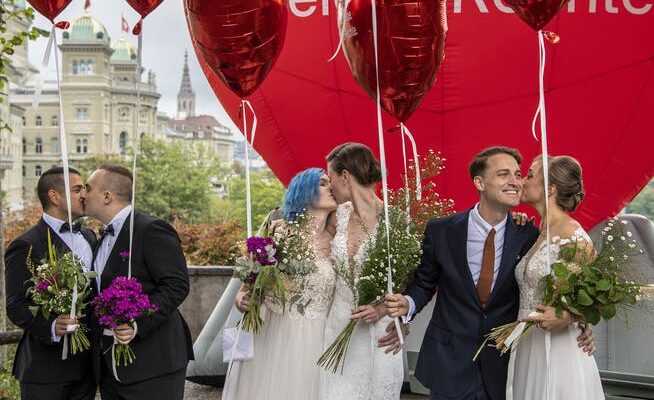With marriage for same-sex couples, the differences in pensions for widows and widowers are exposed in their full injustice. The AHV should neither support childless widows nor subsidize the outdated family model of sole breadwinners.
All couples will soon be equal in front of the altar, but not in front of the AHV (Picture: Action before the vote on “Marriage for All”).
From July 1st, same-sex couples can get married. The people clearly accepted “marriage for all” last year, and implementation is now following. Of course, it is petty to talk about money in the face of a happy event like marriage. Nevertheless, it is permissible to point out that lesbian couples can look forward to the opening of marriage a little more than gay couples. With the new marital status, you will have access to the widow’s pensions from the AHV. In the event that a partner dies before retirement, they can thus enjoy better social security, which is denied to male couples.
Yes, one could go so far as to say that there is a “gay penalty” in the AHV. That may sound a bit shrill. Unlike the marriage penalty, which centrist politicians and retired couples complain about, the discrimination against gay couples is real. When a partner dies early, they are worse off than lesbian and heterosexual couples.
No widow’s pension for childless people
74 years after the introduction of the AHV, the survivors’ pensions for women are still much more generous than for men. The injustice is widely acknowledged; Parliament is making a fresh attempt to solve the problem. Today, men only receive a widower’s pension if they have minor children when their wives die. As soon as the youngest child turns 18, no more money flows. Widows, on the other hand, receive their pensions indefinitely, even if the children have long been able to stand on their own two feet. Even childless women receive widow’s pensions if they are at least 45 years old when their partner dies.
In other words: working women who always looked after themselves receive a widow’s pension averaging CHF 1,600 a month. A man, on the other hand, who has mostly taken care of the children, soon gets nothing, even if the offspring is possibly still in training. That does not make sense.
Before AHV, not everyone is the same. The inconsistencies existed long before ‘marriage for all’, but with its introduction they have now come to the fore in all clarity. The fact that the most important social work is still based on gender is a relic from pre-modern macho times. Pensions for childless widows should be abolished; hopefully they will never be introduced for widowers without children. It cannot be the task of the general public to support childless workers via AHV, regardless of whether they are male or female, heterosexual or homosexual.
When is a couple a couple?
A modern regulation should not be based on gender and certainly not on sexual orientation, but on the care obligations. Survivors’ pensions may be limited to households with children. They should flow at least as long as the offspring is in training – but not significantly longer.
In the future, the AHV should no longer serve as a cheap insurance for an outdated single-breadwinner family model. Fathers and mothers can now organize themselves in such a way that both can return to the labor market as soon as the children are grown. Couples who do not want this cannot expect their role allocation to continue to be subsidised.
A reform of widows’ and widowers’ pensions is overdue, but politically tricky. The term “widow” triggers reflexes that can easily be exploited. Things become even more difficult when unmarried couples are also to have access to survivors’ pensions. The concern is understandable, but an almost endless number of demarcation issues would have to be settled in order to determine when a couple is a couple. In addition, the majority of couples with children still get married. Politicians shouldn’t take on too much. If she finally managed to introduce a gender-neutral regulation for married couples, a lot would be gained.
